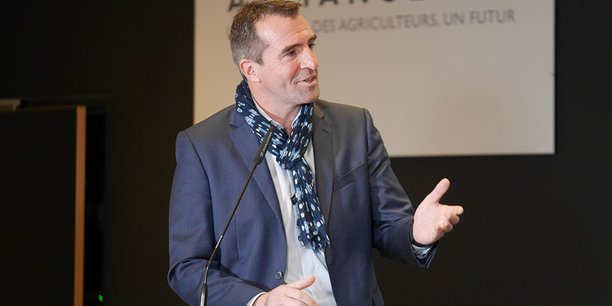LA TRIBUNE- How is this war causing tensions on the grain and oilseed markets?
CHRISTOPHE RICHARDOT- Two years ago, the price of wheat was 170 euros per ton, in 2021, it rose to 180 euros per ton, until reaching a record this Friday at 400 euros per ton. This surge linked to the crisis confirms a high value of cereals, consequences of world markets already stretched between supply and demand.
We may not have peaked yet, but we are seeing significant swings. Two years ago, prices varied from 3 to 4 euros per day, today it is not uncommon to observe variations of 20 to 50 euros. This situation makes the financial management of farms complicated. It is difficult to plan and anticipate. For the BFC Alliance – which brings together three cooperatives in the region (Dijon Céréales, Bourgogne du Sud and Terre Comtoise) – this situation requires significant financial coverage in order to extend our ability to cover our market positions.
Knowing that Russia represents 40% of world exports of ammonium nitrate, present in fertilizers, can we expect a shock on the fertilizer market?
The fertilizers that come from Russia are used in part for the production of our cereals in Bourgogne-Franche-Comté. This will impact the production costs of agricultural plant materials. In 2022, stocks have already been ordered for spring sowing but we are starting to buy the fertilizers needed for next year’s sowing. Fertilizers were worth 250 euros per ton before the health crisis, we went to 600 euros per ton. I think we will have four-figure fertilizers for next year. Hence a strong impact on farms. We may also be under quota, that is to say that there will not be enough fertilizer.
Another consequence: the scarcity of fertilizers will redirect crops towards more legumes. In other words: a drop in wheat acreage in favor of soybeans and peas. The rotations will evolve with a modification of the production ratios between the different species. In order for the agricultural world to be able to supply itself with inputs and market its cereals at an affordable price, the financial envelopes are in the process of doubling. However, agricultural organizations are not used to managing such large lines of credit. Our outstanding needs negotiated with banks were 100 million euros last year, we are heading towards 170 million euros for 2022.
How can rising energy prices affect agricultural production?
Soaring energy and oil prices will affect the cost of transportation. It is already being felt because, for example, our trucks, which run on natural gas, had to be stopped because they were too expensive… Similarly, the rise in natural gas prices will have an impact on production costs, in particular the costs drying – for maize, farmers use dryers to preserve them – manufacturing nitrogen fertilizers, and the energy costs of processing plants.
In France, this will be one of the main consequences of the war, but the question of the cost and availability of the raw materials used will also arise. It will be necessary to be vigilant on the animal sector – which consumes the cereals that we produce – in order to avoid an imbalance in the sectors. If the price of raw materials soars, our customer sectors will find it difficult to obtain supplies. However, the BFC Alliance defends both cereal production and breeders, a large number of our farmers are mixed breeders.
In any case, an increase in direct consumer prices for agricultural products is to be expected in large and medium-sized stores. Faced with these domino effects, the consumer will have to participate in the effort to maintain agricultural production tools.
Russia and Ukraine were the main suppliers of cereals to the Maghreb countries, could this market represent an opportunity for France?
Admittedly, Russia and Ukraine are our main competitors for supplying the Maghreb countries. These developments in the global availability of agricultural raw materials could have significant impacts on the food security of several countries. Tunisia, Lebanon and the countries of Sub-Saharan Africa are more vulnerable, highly dependent on imports from Ukraine. The vulnerability of the Maghreb and Middle East region, already affected by drought, is also accentuated by the crisis. This is why I hope that Ukraine will be able to plant its cereals because we are coming to a period of planting crops. Their production is essential to maintain a global balance. This situation can create drafts, but cereals must remain at an affordable price. We do not want to take advantage of the situation because this crisis is serious. France’s duty is to be able to supply these countries without driving prices up. Also, we will try to be present in the Mediterranean basin.
Do you think the situation should encourage the European Union to question its sovereignty?
For several years, the BFC Alliance has been supporting local agriculture, in particular through its network of local shops, Gamme Vert. We want to raise the bar in terms of communication so that our citizens of Bourgogne-Franche-Comté eat more products “made in BFC”. Another example, for regional proteins, a virtuous circle of production has been set up between cereal producers on the one hand and the breeders who use them on the other. This local sector strategy will remain in place.
The other axis that we have developed is the energy production strategy via gas production and agrivoltaism. This allows us to pursue objectives, both of green energy production at the heart of a sustainable CSR strategy. Because of our dependence on other countries, these two areas of development are essential.
Should we reinvent new commercial exchanges?
This new crisis, after that of the Covid, once again demonstrates the preponderance of agriculture in our ecosystems, close to home but also in global balances.
At some point, will we have to think about exporting our cereals at a geopolitically acceptable price? Or perhaps we will have to imagine new contracts for our farmers, with, for example, the Maghreb countries, their fertilizer suppliers, and us cereal producers…


